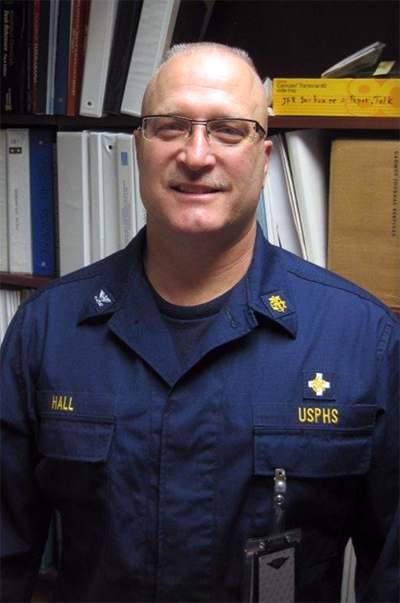CDC Responds to the 2014 Ebola Outbreak: Ron
About CDC

Ron in his office after returning from deployment.
As an officer in the U.S. Public Health Service, deploying into the field to ensure the safety and well-being of the public is all in a day’s work. It requires Ron to be away from his family and normal routine, which means no riding dirt bikes with his son or working in the yard. Based at CDC’s National Institute for Occupational Safety and Health (NIOSH) in Cincinnati, Ron has participated in emergency responses around the country including World Trade Center response, Hurricane Katrina, and the Deepwater Horizon response just to name a few.
While emergency responders assist people directly affected by disasters, Ron is typically part of a team with a different mission – to ensure response and recovery workers are properly protected to safely perform their jobs.
In response to the Ebola outbreak, Ron was part of a Rapid Ebola Preparedness (REP) team where he visited hospitals to evaluate their readiness to safely care for a patient with Ebola. “You’re working in hospitals versus being out at a disaster site, but from an occupational safety and health point of view, we’re still looking out for the workers, which are healthcare workers,” Ron says.
Ron traveled to three hospitals in Indiana and one hospital in Atlanta. “We met with hospital administrators, physicians, nurses, and other staff and walked through the hospitals to assess how they would receive, admit, and handle a potential Ebola patient. We provided recommendations to improve procedures for putting on (donning) and removing (doffing) personal protective equipment,” he explains.
As an occupational safety and health expert, Ron also examined non-healthcare workers that may be involved in the care of an Ebola patient, including receptionists, laboratory workers, and infectious waste handlers to make sure they followed proper workplace practices so they don’t get injured or become ill while performing their duties.
REP teams were comprised of 4 to 10 CDC experts in infection control, occupational health, and laboratory issues, as well as external local experts. According to Ron, “this holistic approach was very important in helping these hospitals achieve what they need to achieve and that’s taking care of Ebola patients safely and efficiently without getting anyone else sick.”
Healthcare workers are natural caregivers. “You see the dedication of healthcare workers who step up and are willing to go in there and make patients feel as comfortable as possible,” says Ron. It was important for him to understand the mindset of healthcare workers to facilitate their confidence in taking precautions to protect themselves. Preparing hospitals at the frontlines of the Ebola outbreak renewed his commitment to workplace safety and health.